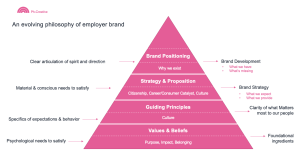When hundreds of Trump supporters violently stormed the U.S. Capitol on Jan. 6, shockwaves were felt around the world. A shining symbol of American democracy was under attack, not from a foreign enemy but at the hands of its own people.
From political leaders to social activists, countless individuals have shared their opinions about the events that took place that day. But this discourse and outrage is not confined to the political arena. Corporate organizations and CEOs have also been putting their foot down.
Facebook and Twitter swiftly banned President Trump’s accounts, while Shopify closed online stores associated with Trump’s campaign. Meanwhile, a number of businesses and chief executives have singled out workers who participated in the riots and cut ties with those individuals.
Point being that at a tumultuous and rocky time, it’s clear that there is a compelling opportunity for employers to take a stand, test their employer brand, and ask questions about who they are and what they believe in.
Who Are You?
Asking who you are and what you stand for doesn’t mean that companies need to verbalize their beliefs — sometimes actions speak louder than words. As we saw, firing employees for actions that do not align with a company’s employer brand is a strong statement that reaffirms corporate values.
The role of employer brand here is to offer companies the ability to ask these questions ahead of time, so you can establish a clear playbook. If you invest in the development of a meaningful and effective employer brand, then by definition you know who you are and what you stand for. This means there is a common understanding and acceptance of your policies and the circumstances under which you’d take actions.
The precise mechanism of this will be different depending on the organization, its employer brand, and the values that underpin it. In some cases, the right decision may be to protect freedom of speech and diversity of thought, if these are issues that are ingrained in a company’s culture. In other instances, companies may have a much shorter tolerance for what they allow.
It’s important to note that in either case, neither of these is right or wrong. Rather, by clearly defining and articulating your unique employer brand, you can set the same rules of engagement for everyone, regardless of personal beliefs or opinions.
From Reactive to Proactive
It’s natural that an event such as the Capitol storming would stir up a great deal of emotion. Reacting emotionally, however, can be a problem, especially if companies are attempting to ask and answer important questions about their employer brand in real-time.
Indeed, there’s often a feeling of urgency to define who you are, what you believe, and how to translate that into policy. The intention might be good, but the execution is often scant.
Instead, organizations need to shift from this reactive approach and move toward a more proactive and well-defined employer brand strategy, one that encourages people to have conversations ahead of time. In that way, an effective employer brand is not a policy but it is a lens through which to help create one.
Put otherwise, an employer brand is more than just marketing or communications. It should articulate — with a high degree of substance, depth, clarity, and specificity — your culture in a way that influences and complements policy.
Two-Way Value Proposition
An authentic employer brand should use a two-way value proposition that articulates the harsh realities people must be willing to accept and overcome in order to thrive at your organization. When such obstacles, challenges, and hardships are paired with the benefits employees stand to receive in return, then you’ve set the foundation for an employee experience that provides true purpose, impact, and belonging.
As events like the Capitol storming show, we often need an additional lens to distill and define the material manifestation of employee needs. This is where aspects such as culture, career catalyst, and citizenship come into play. By designing an employer brand with these three ingredients in mind, you can consciously characterize an employer brand that delivers on the needs of your people.

Citizenship, in particular, is highly relevant to the question of how far an employer brand should extend during controversial events. It encapsulates issues such as political voice, social responsibility, diversity, and integrity of leadership. As such, it plays a key role in the overall development of an effective employer brand.
Ultimately, by evolving employer brand to satisfy these material and conscious needs, you can build a culture that is clear, consistent, and fair — even in the face of unsettling events. Especially in the face of unsettling events.
